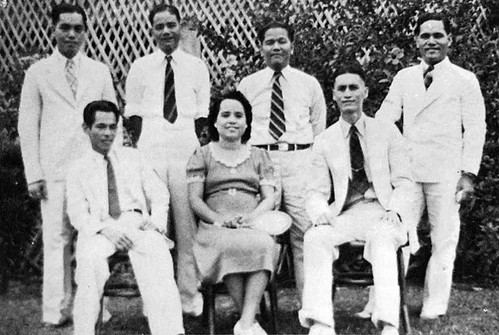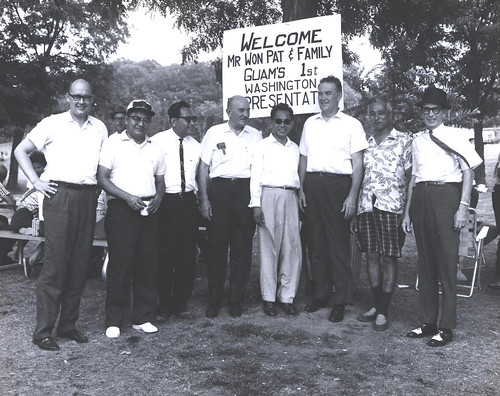View more photos for the Congressman Antonio B. Won Pat entry here.
Guam politics mainstay
First elected to the Guam Congress in 1936, Antonio Borja Won Pat (1908 – 1987) was a mainstay in Guam politics. He was most noted for spearheading the Organic Act of Guam and acting as the island’s first Washington representative in the US Congress.
Political career began in the 1930s
Won Pat was born in Sumai, Guam on 10 December 1908. He married Ana Perez in 1932 and together they had eight children: Aveline, Marilyn, Jacqueline, Ellen, Anthony, Rosalind, Judith and Mark.
Won Pat completed his primary education at the Normal School in Hagåtña. He then became a teacher and after teaching for eight years, Won Pat was nominated to the advisory Guam Congress in 1936. Prior to the signing of the Organic Act in 1950 which provided for US citizenship and limited self-government, Guam’s citizens were under complete US Navy rule.
The pre-Organic Act Guam Congress sat only as an advisory body to the naval governor. It consisted of two houses – the House of Council and the House of Assembly. Its members were elected by the people of their districts.
Following World War II, Won Pat began to attain influence on the island forming the Guam Commercial Corporation in 1946. Supported by the naval government, he prioritized economic self-sufficiency before achieving citizenship. GCC played a role in the post-war economic boom, but ultimately went bankrupt in 1954. By this time, Won Pat was entrenched in the House of Assembly beginning in 1948 becoming speaker of the Guam Legislature in 1951.
Political landmarks
After World War II, the drive for American citizenship gained momentum due to the Chamorro’s loyalty to the United States during the Japanese occupation of Guam. After attaining the role of speaker in the Guam Congress, Won Pat along with naval Governor Carlton Skinner and Francisco B. Leon Guerrero, began work on what would become the Guam Organic Act. Gaining approval in Washington D.C., the act gave the people of Guam American citizenship and the right to establish a civil government.
Guam took another step toward self-representation under Won Pat in 1964 when I Mina’ Siete na Liheslaturan Guåhan/the 7th Guam Legislature created Guam’s Washington Office, as an elected position. Won Pat lobbied for the post and won it. While in office Won Pat spread awareness to the other state representatives about Guam and the political situation it was in, and increased federal support followed his effective lobbying.
First Guam delegate to Congress
In his post in Washington, DC, Won Pat continued the battle to gain representation in Congress and in the process gained many allies. These allies included California Congressman Philip Burton, a member of the House Interior and Insular Affairs Committee. Burton used his influence to gain the support of committee chairman Wayne Aspinall and twenty co-sponsors. Public Law 92-271 was passed on 10 April 1972. The groundbreaking bill gave Guam and the Virgin Islands representation in Congress for two-year terms. Elected officials could now speak on the House floor and introduce new legislation though they could not vote on the floor. On 3 January 1973, Won Pat became the first resident of Guam to take the oath of office as a member of the 93rd Congress.
The end of the trust territories
While Won Pat was Guam’s delegate to the US Congress his efforts weren’t limited to his constituents on Guam. During his tenure as delegate to the U.S. Congress, he was instrumental in helping what are now the Commonwealth of the Northern Mariana Islands (CNMI); the Federated States of Micronesia, comprised of the island states of Kosrae, Pohnpei, Chuuk, and Yap; the Republic of the Marshall Islands and the Republic of Palau achieve more political self governance through the dismantling of the Trust Territories of the Pacific Islands.
Shortly after World War II, the Trust Territory of the Pacific Islands, not including Guam, was created and administered by the United States. In the 1970s work began to dissolve the Trust Territory as the districts voted to end their trustee statuses. The last district to gain political independence was Palau in 1994. The Northern Mariana Islands is now a US Commonwealth (CNMI) and its people US citizens. The Federated States of Micronesia, the Republic of the Marshall Islands, and the Republic of Palau negotiated Compacts of Free Association with the United States.
Consequently, Guam’s northern neighbors, all much more recent members of the American family, have the right to determine issues on a local level, including issues such as minimum wage and immigration, where as the residents of Guam do not.
Won Pat continued to play a highly visible role in Guam politics until suffering a defeat at the hands of Republican Ben Blaz in 1984 for the position of the Washington delegate. On 2 May 1987, Won Pat died of a heart attack.
For further reading
Guam Tribune. “Antonio B. Won Pat Made History for Guam.” 1 August 1986.
Rogers, Robert. Destiny’s Landfall: A History of Guam. Honolulu: University of Hawai’i Press, 1995.
Won Pat, Antonio B. “Commencement Address.” University of Guam, Mangilao, GU, 12 May 1978.




